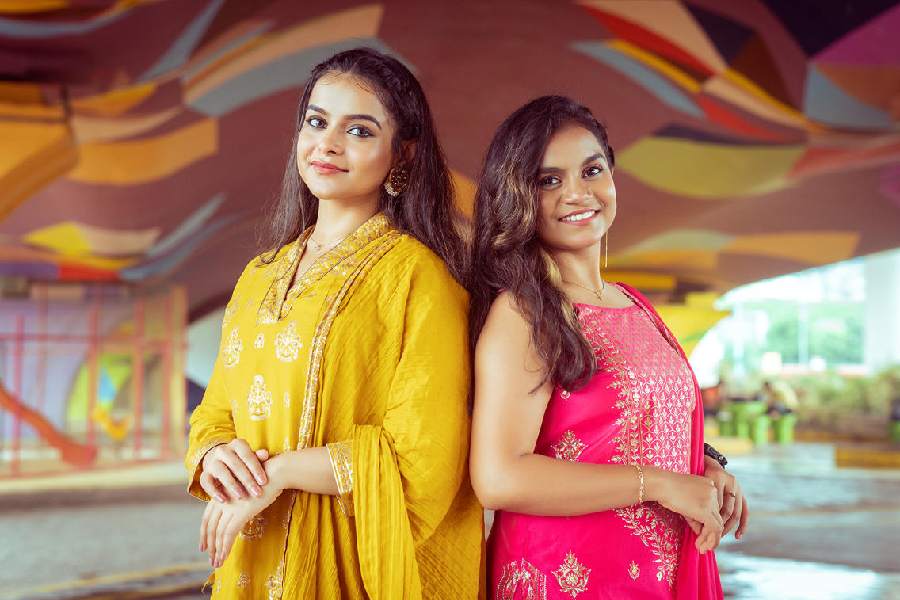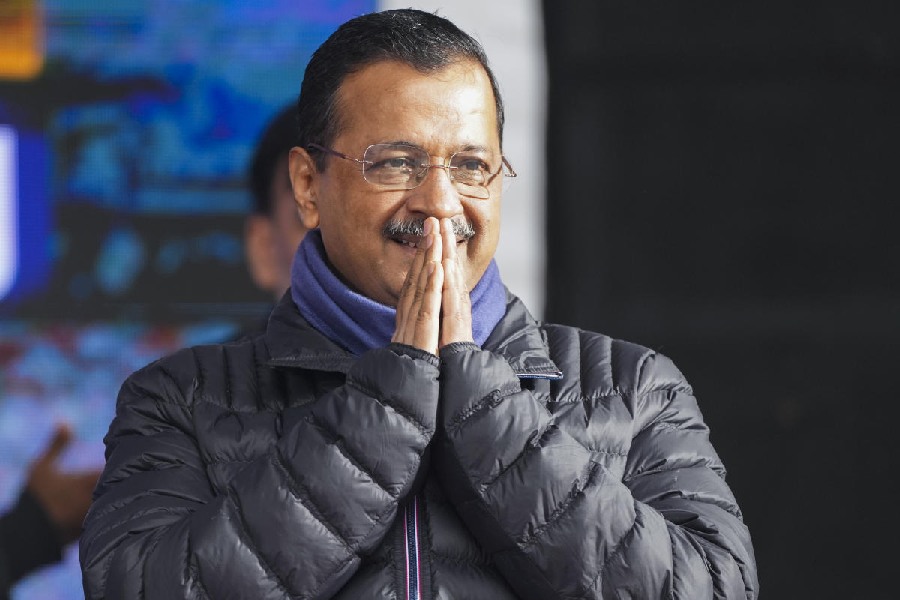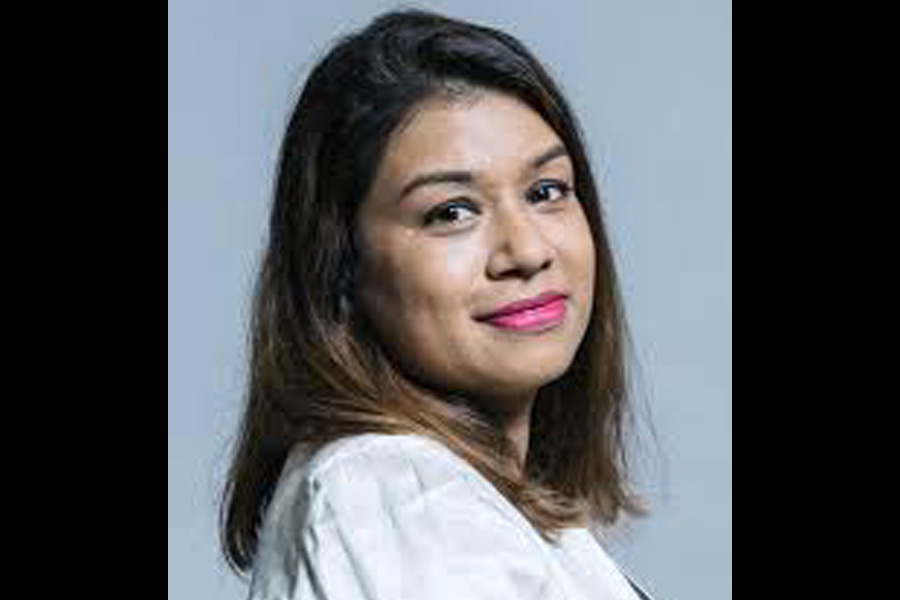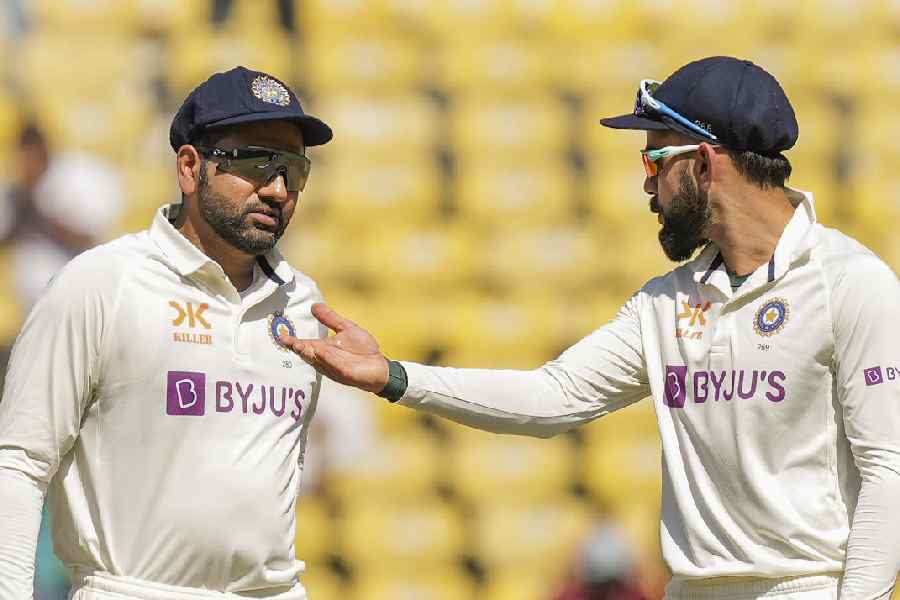The foot-tapping number Nakku nakur na jao thakur sung by the Nandy sisters (Antara and Ankita Nandy) from the film Raktabeej has won many hearts. Written and composed by Anindya Chatterjee, Nakku nakur is a memorable addition to the rich repository of Puja numbers. A t2 chat with the Nandy sisters.
What intrigued you about the song?
A lot of things actually. But when we first heard the song, we could relate to it. The vibe of the song is totally in sync with our personalities and what we like doing. We’re all about being happy-go-lucky and putting up peppy numbers, and that’s exactly what the song is. We loved the fact that the song isn’t totally Bangla, it’s a different dialect of Bangla and we always wanted to sing a different dialect of Bangla. The song is an interpretation of a very celebrated folk song, Noya Daman, so that’s another factor that intrigued us.
It was like a dream come true as we always wanted to sing for a Bengali movie and it finally happened and for a song like Nakku nakur, we were thrilled. We flew down from Pune to Calcutta for the recording and had a gala time!
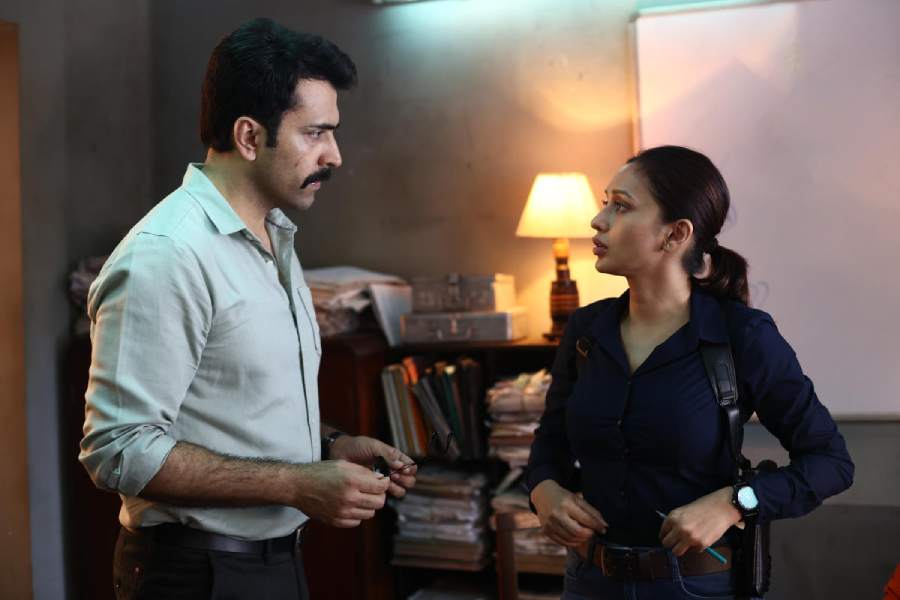
A moment from Raktabeej
What are your thoughts on Bengali film music?
We’ve grown up in Calcutta listening to Bengali film music and we’ve been obsessed with Bangla music. As aspiring musicians, we always wanted to do this because of the sheer love we have for the kind of music we’ve grown up listening to. We’re huge fans of Chandrabindoo, so it was a great experience for us to work with Anindya sir.
How was your experience shooting for the song?
It was quite fun. We flew down from Pune for it. We were dressed in shada sari laal paar, which we absolutely love. The day we shot this song, they were wrapping up the last schedule of Raktabeej and we were there in the same place where Mimidi and Abirda were also shooting and it was quite thrilling. We caught the last glances of the film’s shoot and it actually hit us that we were a part of an actual Bengali film and how big an opportunity it is.
Do you have plans to do any more Bengali film songs?
If we get an opportunity we’ll come running! We’re just waiting for it to come our way!
How was your childhood in Assam?
Antara: We’re probashi Bangalis. Our family is from Assam but we moved to Calcutta when we were quite young. Our parents decided to move to Calcutta so that I get the best of Hindustani classical training. Ankita probably has no memory of being in Assam as she was just a year old when we moved. However, we do visit our hometown during holidays but the two of us spent the last 13 years in this city.
What inspired you to do music?
Antara: We’ve always had gaaner chorcha at home. Nobody took it up as a career but everyone is a music lover at home. Our grandfather used to play the violin as a hobby, our maternal grandfather was a great folk singer, our mother used to love music and was a dancer, and our father could play any stringed instrument even though he didn’t receive any professional training. So our inspiration began at home. Then, of course, Lataji, Ashaji, my guruji Rashid Khan saab, and the list is never-ending. Before we dreamt, our mom dreamt. She really wanted to become a dancer but couldn’t pursue it, and when she saw I could sing in pitch, she ensured I was trained enough to follow my dreams. Ankita was a surprise package.
Ankita: Basically, I came into music unexpectedly. Since my childhood, it was Didi who underwent serious training and went for a reality show and she wanted to seriously pursue music. My duty was to be the naughty child of the household. I grew up with music around me and grasped it fast. When people would visit and hear us both sing, they’d appreciate both of us.
Antara: I’ve always seen her do things without much effort, and when I was in high school and she was in seventh/eighth grade, we put out our first video together on Facebook, which was super random and wanted to make music with whatever was there at our disposal. The video became viral and on the comments section I came across, stuff like “Antara is good but Ankita is also good” or “We like Ankita’s voice” and that sort of validation I think worked for her really well. She came to me and said: “Didi are you sitting for riyaaz? Can I sit?”, and I was like, all these years what I couldn’t do, the comments did. (Both of them laugh). I feel great that she takes the lead in a lot of our projects.
How do you think Nakku nakur may have had an impact on people who watched the film during Puja?
We’ve grown up seeing Puja songs and having our own Pujor gaan during the festival in a film, is surreal and it’s a very important milestone in our lives. It is a very fun song that encapsulates all the feelings one might go through during Puja. If you listen to it, you’ll get the images in front of your eyes. The song is so well-written that when you listen to the song, you can see the imagery, especially when Maa is going away and you don’t want her to go. The smell, feel, and visions of Puja come together in a feel-good number that you can dance to and unwind. The tune sticks. We enjoyed it thoroughly and were done with the recording in 45 minutes. It was probably our quickest recording. We’ve recreated numbers and posted them on social media because no one knew us, yet we’ve received support thoroughly. This is finally our own number in a film, and I really hope people enjoyed it to the fullest.
Which Puja number has been your favourite?
The Mahalaya song for sure. Especially, as people who’ve moved out of Calcutta, the songs have a completely different meaning in our lives now. Jaago tumi jaago and all the Mahalaya songs, Aye re chhute aye, and all these songs.
How did you develop your unique singing style?
It happened on a natural course. We grew up listening to other people and recreating numbers. We tried to find what worked for us and how could we stand out. When we started posting on social media, we wanted to be unique. It was a process, that took up time and we’re still finding our path. We’ve kept evolving, our journey as a whole has been trial and error. We tried, failed and we tried again. When we did succeed, we held onto that and tried to innovate further.
Antara, how was your personal journey in this career?
I started off with big dreams, I saw more downs than ups but I don’t regret it. I celebrate my victories a little more. My parents have always supported me and are a hundred per cent involved in our career. We both are tremendously lucky to have that kind of support. We moved to Calcutta, then I started training under my guruji Rashid Khan. But music was like an incentive... only if I scored well in school, was I allowed to sing at home. That way I balanced both. Only after I went to (Sa re ga ma pa) Li’L Champs in 2009, I started considering it as a profession. My teenage years were difficult. My voice changed and I completely lost my voice. I gave up and was totally demotivated. When I went for recordings, I was told I should not sing, my voice wasn’t sweet enough, I shouldn’t bother doing music and my willpower was shattered. I did undergo therapy and bounced back. I learnt techniques to control my tonal quality, took training more seriously, became a scholar at Sangeet Natak Akademi, and classical became a strong point. From there, my journey on social media was what opened up new avenues for us. We ushered in the love and we created our own platform, so we started posting very regularly.
We all moved to Pune for my college, and then I started travelling to Mumbai, but after the lockdown, I got totally frustrated but we both decided to do some music and start posting again. We held some balcony concerts and covered 26 languages, Ankita picked up how to play the ukulele, and we did some 173 shows for leading corporate firms. Opportunities came in and now in films. So it indeed has been a superb journey!

